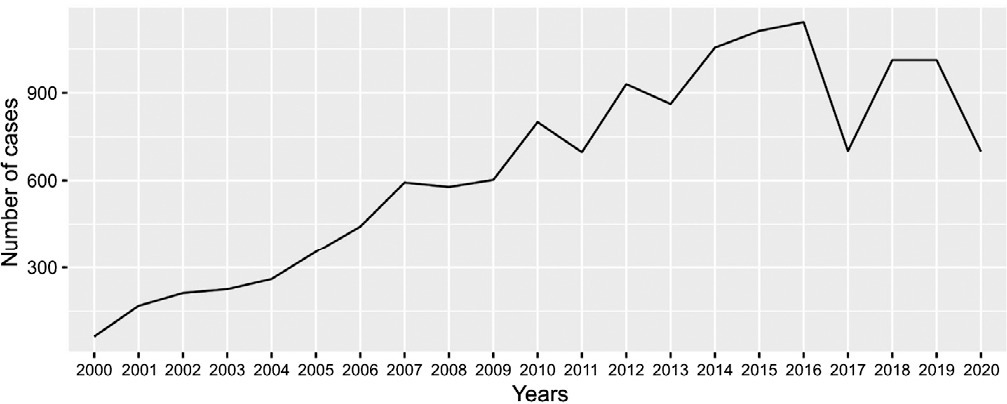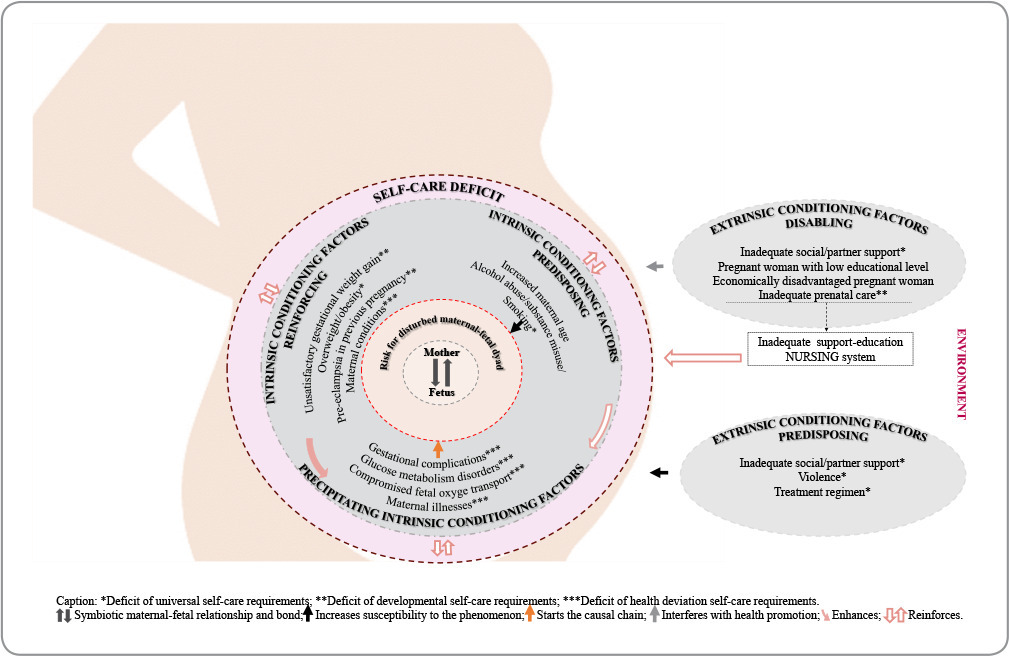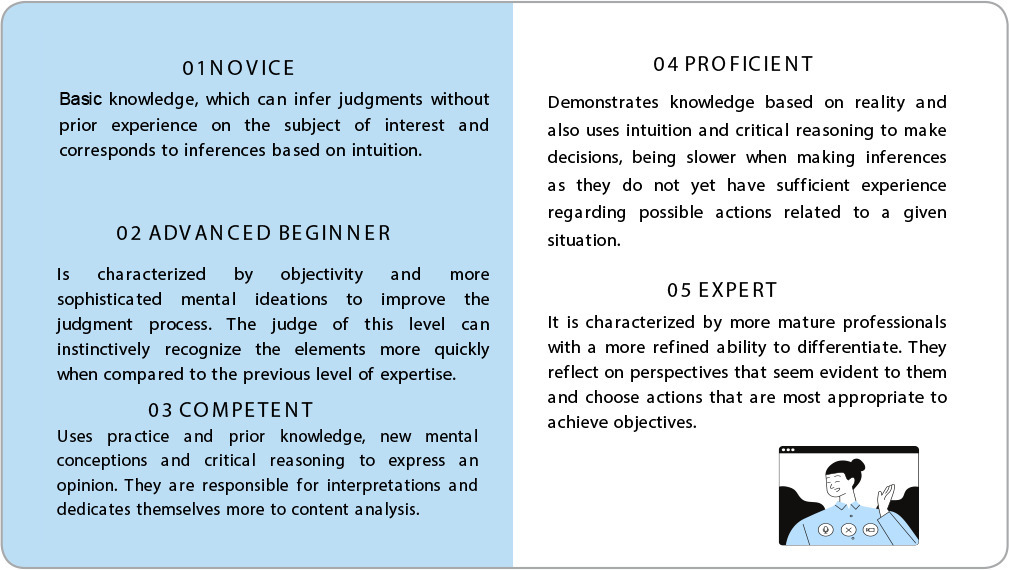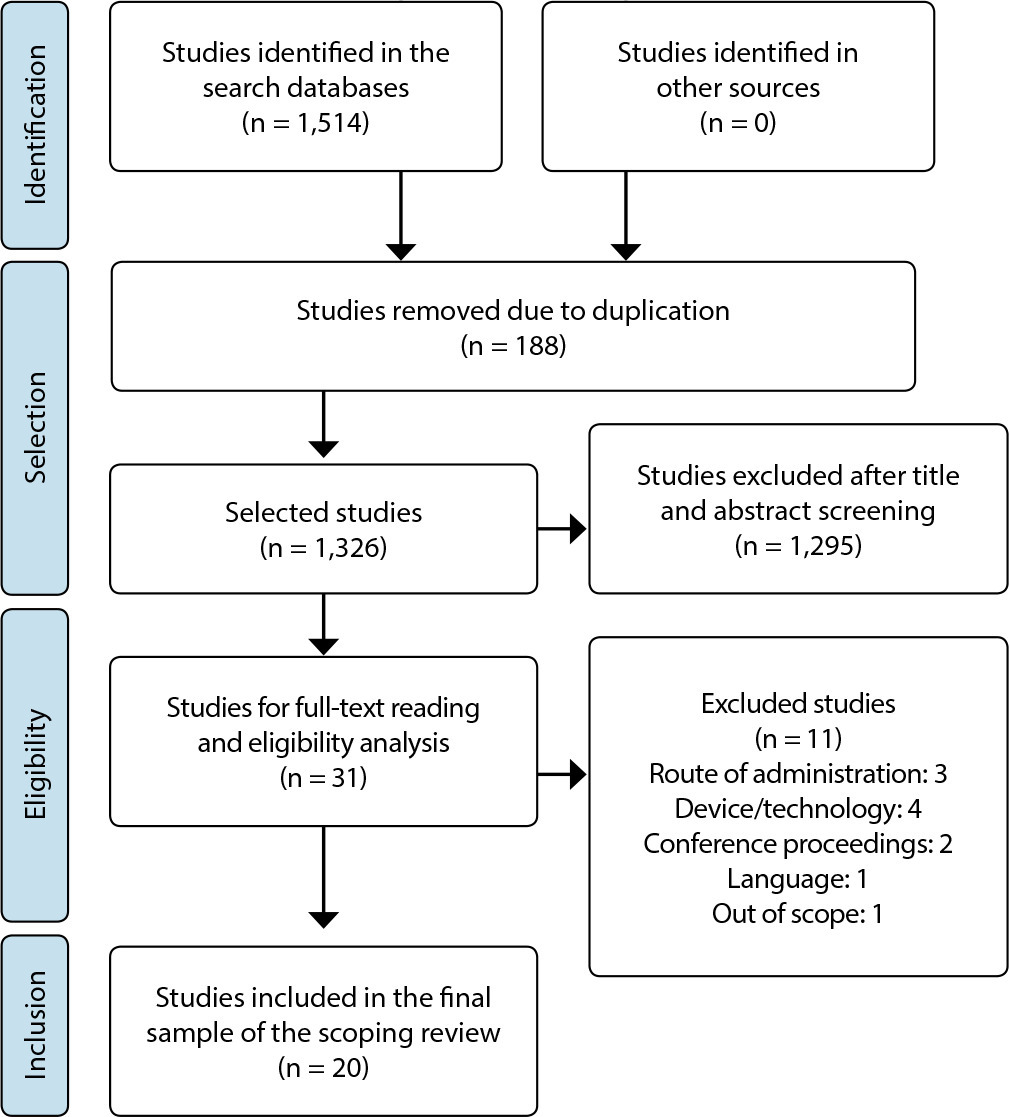-
ORIGINAL ARTICLE07-29-2024
Primary Health Care in transitional care of people with stroke
Revista Brasileira de Enfermagem. 2024;77(3):e20230468
Abstract
ORIGINAL ARTICLEPrimary Health Care in transitional care of people with stroke
Revista Brasileira de Enfermagem. 2024;77(3):e20230468
DOI 10.1590/0034-7167-2024-0468
Views0ABSTRACT
Objectives:
to understand the role of Primary Health Care teams in caring for people with stroke after hospital discharge.
Methods:
single case study, with integrated units of analysis, with a qualitative approach. Data triangulation occurred through interviews with professionals and family caregivers involved in transition of care, in addition to direct observations in rounds and document analysis. For the analyses, the analytical strategies of theoretical propositions and construction of explanations were used, with the help of ATLAS.ti®.
Results:
the importance of counter-referral, the role of community health workers and the multidisciplinary team, health promotion, secondary prevention, home visits as a visceral attribute and nurses as care managers are evident.
Final Considerations:
the high demand on teams and the Social Determinants of Health interfere with adequate continuity of care. Transitional care programs that enable continuity of care are recommended.
Keywords:Comprehensive Health CareContinuity of Patient CarePrimary Health CareStrokeTransitional CareSee more -
ORIGINAL ARTICLE07-29-2024
Completeness of variables in Hospital-Based Cancer Registries for prostatic malignant neoplasm
Revista Brasileira de Enfermagem. 2024;77(3):e20230467
Abstract
ORIGINAL ARTICLECompleteness of variables in Hospital-Based Cancer Registries for prostatic malignant neoplasm
Revista Brasileira de Enfermagem. 2024;77(3):e20230467
DOI 10.1590/0034-7167-2023-0467
Views0See moreABSTRACT
Objectives:
to analyze the completeness of variables from Hospital-Based Cancer Registries of cases of prostate neoplasm in the Oncology Care Network of a Brazilian state between 2000 and 2020.
Methods:
an ecological time series study, based on secondary data on prostate cancer Hospital-Based Cancer Registries prostate. Data incompleteness was classified as excellent (<5%), good (between 5%-10%), fair (10%-20%), poor (20%-50%) and very poor (>50%), according to the percentage of lack of information.
Results:
there were 13,519 cases of prostate cancer in the Hospital-Based Cancer Registries analyzed. The variables “family history of cancer” (p<0.001), “alcoholism” (p<0.001), “smoking” (p<0.001), “TNM staging” (p<0.001) had a decreasing trend, while “clinical start of treatment” (p<0.001), “origin” (p=0.008) and “occupation” (p<0.001) indicated an increasing trend.
Conclusions:
most Hospital-Based Cancer Registries variables showed excellent completeness, but important variables had high percentages of incompleteness, such as TNM and clinical staging, in addition to alcoholism and smoking.

-
ORIGINAL ARTICLE07-29-2024
Disrupted mother-fetus dyad risk in high-risk pregnancies: a Middle-Range Theory
Revista Brasileira de Enfermagem. 2024;77(3):e20230464
Abstract
ORIGINAL ARTICLEDisrupted mother-fetus dyad risk in high-risk pregnancies: a Middle-Range Theory
Revista Brasileira de Enfermagem. 2024;77(3):e20230464
DOI 10.1590/0034-7167-2023-0464
Views0See moreABSTRACT
Objectives:
to develop and evaluate a Middle-Range Theory for the nursing diagnosis “Disrupted Mother-Fetus Dyad Risk” in high-risk pregnancies.
Methods:
this methodological study was conducted in two stages: theory development and evaluation. Dorothea Orem’s General Nursing Model was used as the theoretical-conceptual foundation. Evaluation was conducted using the Delphi method with seven judges, and consensus was achieved when the Content Validity Index of the evaluated items was ≥ 0.80.
Results:
the theory identified 20 elements of the nursing diagnosis “Disrupted Mother-Fetus Dyad Risk” (10 risk factors, 4 at-risk populations, and 6 associated conditions), 14 propositions, and 1 pictogram. After two rounds of evaluation, the theory was considered consistent, with consensus reached for all items, each achieving a Content Validity Index ≥ 0.80.
Conclusions:
the Middle-Range Theory included biopsychosocial factors explaining the nursing phenomenon “Disrupted Mother-Fetus Dyad Risk,” which aids in nurses’ diagnostic reasoning.

-
ORIGINAL ARTICLE07-29-2024
Mental health of parents of children and adolescents who require special health care
Revista Brasileira de Enfermagem. 2024;77(3):e20230457
Abstract
ORIGINAL ARTICLEMental health of parents of children and adolescents who require special health care
Revista Brasileira de Enfermagem. 2024;77(3):e20230457
DOI 10.1590/0034-7167-2023-0457
Views0See moreABSTRACT
Objective:
To identify the manifestations presented by parents of children and adolescents who require special health attention that can impact their mental health.
Methods:
exploratory, qualitative research, based on the concept of vulnerability, with data collection carried out through interviews with 18 parents of children and adolescents with special health care needs, hospitalized in the pediatric ward of a hospital in Paraná, between May/2017 and May/ 2018. Data analyzed by inductive thematic analysis.
Results:
parents experienced situations of vulnerability when providing care at home, with repercussions on their mental health, expressed by manifestations of lack of protection, anxiety and depression.
Final considerations:
It is important that health professionals seek to expand actions to promote care and reduce situations that generate threats, insecurities, concerns and damage to the health of parents, which can impact and further weaken care for children and adolescents who need attention especially health.
-
REVIEW07-29-2024
Profile of scientific production on nursing technology construction, validity and application: a bibliometric study
Revista Brasileira de Enfermagem. 2024;77(3):e20230452
Abstract
REVIEWProfile of scientific production on nursing technology construction, validity and application: a bibliometric study
Revista Brasileira de Enfermagem. 2024;77(3):e20230452
DOI 10.1590/0034-7167-2023-0452
Views0See moreABSTRACT
Objective:
to analyze the profile of scientific production on nursing technology construction, validity and application.
Methods:
this is a bibliometric study, carried out in six databases, based on the Methodi Ordinatio application, arranged in nine stages. To represent the findings, the VOSviewer® software was used.
Results:
346 studies were identified, obtained from BDENF, CINAHL, EMBASE, LILACS, PubMed/MEDLINE, Scopus and Web of Science. There was a predominance of the English language, and 20% of the authors hold more than 25% of studies. Only two journals account for 25% of studies in the period studied. Twenty-six studies were selected for the InOrdinatio classification. Nursing Process (23%) stood out among the studies. The most produced technology was software (27%), and 50% of works describe construction and validity.
Conclusions:
there is an emphasis on the creation of educational technologies, especially information technology. The data demonstrates opportunities for future research in the area.

-
ORIGINAL ARTICLE07-29-2024
Evaluation of software technical quality for collecting data from patients under palliative care
Revista Brasileira de Enfermagem. 2024;77(3):e20230435
Abstract
ORIGINAL ARTICLEEvaluation of software technical quality for collecting data from patients under palliative care
Revista Brasileira de Enfermagem. 2024;77(3):e20230435
DOI 10.1590/0034-7167-2023-0435
Views0See moreABSTRACT
Objectives:
to evaluate software technical quality for collecting data from patients under palliative care.
Methods:
this is methodological technology evaluation research, according to the technical standard International Organization for Standardization/International Electrotechnical Commission 25040-2011, developed from August 2021 to August 2023. Eight nurses and eight information technology professionals participated as judges, who evaluated six quality characteristics and 23 subcharacteristics. Items that reached a percentage of agreement greater than 70% were considered suitable.
Results:
the characteristics evaluated by nurses/information technology professionals received the following percentages of agreement, respectively: functional suitability (94%-84%); reliability (100-70%); usability (89.9-66.8%); performance efficiency (95.8%-86.1%); compatibility (95.8-79.6%); and safety (96%-83.4%).
Conclusions:
the software was considered suitable in quality evaluation to offer support to nurses in collecting patient data under palliative care, with the potential to operationalize the first Nursing Process stage.

-
ORIGINAL ARTICLE07-29-2024
Sexual counseling for people with acute coronary syndrome: educational video development
Revista Brasileira de Enfermagem. 2024;77(3):e20230416
Abstract
ORIGINAL ARTICLESexual counseling for people with acute coronary syndrome: educational video development
Revista Brasileira de Enfermagem. 2024;77(3):e20230416
DOI 10.1590/0034-7167-2023-0416
Views0See moreABSTRACT
Objective:
to assess validity evidence of an educational video on safe sexual activity after acute coronary syndrome.
Method:
study in three phases: video development; content validity analysis by 11 experts; and analysis of validity based on response processes by seven people with coronary disease. The content validity ratio (CVR) was calculated with critical values for the second phase of 0.63 and for the third of 1.0.
Results:
the video addressed the importance of resuming sexual activity and positions that consume less energy, clinical warning signs, the importance of adhering to treatment and a welcoming environment for sexual practice. A CVR above the critical value was obtained with a total of 4 minutes and 41 seconds.
Conclusion:
the educational video brings together adequate content validity evidence and can be used as a tool for patients after acute coronary syndrome.

-
REVIEW07-29-2024
Utilization of local pressure devices in pain management during injections: scoping review
Revista Brasileira de Enfermagem. 2024;77(3):e20230399
Abstract
REVIEWUtilization of local pressure devices in pain management during injections: scoping review
Revista Brasileira de Enfermagem. 2024;77(3):e20230399
DOI 10.1590/0034-7167-2023-0399
Views0See moreABSTRACT
Objective:
to map scientific evidence regarding the use of local pressure devices in pain relief during injection procedures in patients.
Methods:
scoping review, following the recommendations of the JBI Manual for Evidence Synthesis and PRISMA-ScR, with searches conducted in the PubMed, EMBASE, CINAHL, LILACS, and PsycINFO databases, without temporal restrictions and with a cutoff date of March 2023.
Results:
a total of 1,514 studies were identified, with 20 articles included in the final sample. The ShotBlocker® device was utilized during subcutaneous and intramuscular injections in children and adults, proving beneficial in reducing pain, anxiety, and fear associated with the procedure.
Final considerations:
the ShotBlocker® is a low-cost, easy-to-use device that can enhance nursing clinical practice during painful procedures. However, studies involving the Brazilian Pikluc® device are scarce. Further research involving both local pressure devices is recommended.

-
Palliative care strategies in the management of people with serious cases of COVID-19
Revista Brasileira de Enfermagem. 2023;76:e20220308
Abstract
Palliative care strategies in the management of people with serious cases of COVID-19
Revista Brasileira de Enfermagem. 2023;76:e20220308
DOI 10.1590/0034-7167-2022-0308
Views0See moreABSTRACT
Objectives:
to analyze the assistance strategies in palliative care developed in the COVID-19 pandemic for critically ill patients and their families.
Methods:
an integrative review carried out in August 2021 and updated in April 2022 in the Base de Dados de Enfermagem (BDENF), Cumulative Index to Nursing and Allied Health Literature (CINAHL), Medical Literature Analysis and Retrieval System Online (MEDLINE), US National Library of Medicine (PubMed), Web of Science databases, and presented in the PRISMA flowchart.
Results:
thirteen works were selected for reading and content analysis, from which emerged the two main themes that reflect the reality evidenced in this context: The sudden advent of COVID-19 with impacts on palliative care; and The strategies used in palliative care to mitigate these impacts.
Final Considerations:
palliative care is the best strategy for providing health care, used as a comfort to bring relief and comfort to patients and families.

-
ORIGINAL ARTICLE03-06-2023
Construct elaboration and validity of the Pregnancy Depression Risk Scale
Revista Brasileira de Enfermagem. 2023;76(2):e20220306
Abstract
ORIGINAL ARTICLEConstruct elaboration and validity of the Pregnancy Depression Risk Scale
Revista Brasileira de Enfermagem. 2023;76(2):e20220306
DOI 10.1590/0034-7167-2022-0306
Views0See moreABSTRACT
Objectives:
to elaborate and analyze the Pregnancy Depression Risk Scale psychometric properties.
Methods:
methodological research, in six steps: theoretical model empirical definition; elaboration of scale items with literature review; consultation with five professional health experts and 15 pregnant women; content validity with six experts; pre-test-semantic validity with 24 pregnant women; scale factor structure definition with 350 pregnant women; pilot study with 100 pregnant women, totaling 489 pregnant women and 11 experts. Data were analyzed by content analysis, exploratory factor analysis, multitrait-multimethod analysis and internal consistency.
Results:
sixty-eight risk factors were identified for item formulation. The final version of the scale consisted of 24 items in five domains. The scale demonstrated satisfactory construct content, semantic, validity and reliability.
Conclusions:
the scale proved to be valid in terms of content and semantics, with a factor structure defined according to the adopted theoretical model and satisfactory psychometric properties.
-
ORIGINAL ARTICLE03-06-2023
Medication reconciliation in pediatrics: a validation of instruments to prevent medication errors
Revista Brasileira de Enfermagem. 2023;76(2):e20210755
Abstract
ORIGINAL ARTICLEMedication reconciliation in pediatrics: a validation of instruments to prevent medication errors
Revista Brasileira de Enfermagem. 2023;76(2):e20210755
DOI 10.1590/0034-7167-2021-0755
Views0ABSTRACT
Objectives:
to develop and validate the content of two instruments for promoting medication reconciliation for the transition of care of hospitalized children.
Methods:
methodological study, conducted in five stages: scope review for conceptual structure; elaboration of the initial version; content validation with five specialists using the Delphi technique; reassessment; and construction of the final version of the instruments. A content validity index of at least 0.80 was adopted.
Results:
three rounds of evaluation were carried out to reach the validity index of the proposed contents, whereas a new analysis of 50% of the 20 items of the instrument aimed at families, and 28.5% of the 21 items aimed at professionals was necessary. The instrument aimed at families reached an index of 0.93, and the instrument for professionals, 0.90.
Conclusions:
the proposed instruments were validated. It is now possible to proceed with practical implementation studies to identify their influence on safety during medication reconciliation at transition of care.
Keywords:Medication errorsMedication ReconciliationPatient SafetyPediatricsProfessional-Family RelationsSee more
-
ORIGINAL ARTICLE03-06-2023
Organizational politics and professional struggles in nursing
Revista Brasileira de Enfermagem. 2023;76(1):e20220180
Abstract
ORIGINAL ARTICLEOrganizational politics and professional struggles in nursing
Revista Brasileira de Enfermagem. 2023;76(1):e20220180
DOI 10.1590/0034-7167-2022-0180
Views0See moreABSTRACT
Objective:
to analyze the professional struggles between nursing organizational entities, in Rio de Janeiro, during the Regional Nursing Council’s electoral process (1990-1993 administration).
Method:
historical study. We used journalistic articles, normative documents, legislation and semi-structured interviews with five nursing professionals who participated in this process. Interpretation of findings was supported by Bourdieu’s concepts of habitus, field, capital, and symbolic power.
Results:
Electoral Code changes of the aforementioned council, under the influence of administration (1987-1990), candidate for re-election, influenced the disclosure and eligibility criteria, making it difficult for broad participation, especially of Associação Brasileira de Enfermagem Rio de Janeiro Section.
Final considerations:
nursing, in this period, generated a field of disputes related to positions of power and gender, which was evidenced in the electoral process studied, which highlighted using limiting strategies by a group, making it difficult for the entire category to participate.
-
EDITORIAL02-06-2023
Proyecto Termómetro Social COVID-19: articulaciones transnacionales para abordar poblaciones en situación de vulnerabilidad social
Revista Brasileira de Enfermagem. 2023;76:e76suppl201
Abstract
EDITORIALProyecto Termómetro Social COVID-19: articulaciones transnacionales para abordar poblaciones en situación de vulnerabilidad social
Revista Brasileira de Enfermagem. 2023;76:e76suppl201
DOI 10.1590/0034-7167.202376suppl201es
Views0El COVID-19 es una enfermedad infecciosa que ha impactado significativamente diferentes contextos alrededor del mundo, directa y/o indirectamente, y en mayor escala en países pobres y/o en vías de desarrollo(). No sabemos con certeza los efectos acumulativos del COVID-19 en las poblaciones (trastornos mentales, insomnio, ansiedad, trombosis, déficit cognitivo, problemas de memoria, etc.) tras la […]See more -
EDITORIAL02-06-2023
COVID-19 Social Thermometer Project: transnational articulations to approach populations in situations of social vulnerability
Revista Brasileira de Enfermagem. 2023;76:e76suppl201
Abstract
EDITORIALCOVID-19 Social Thermometer Project: transnational articulations to approach populations in situations of social vulnerability
Revista Brasileira de Enfermagem. 2023;76:e76suppl201
DOI 10.1590/0034-7167.202376suppl201
Views0COVID-19 is an infectious disease that has significantly impacted different contexts around the world, directly and/or indirectly, and on a larger scale in poor and/or developing countries(). We do not know for sure the cumulative effects of COVID-19 on populations (mental disorders, insomnia, anxiety, thrombosis, cognition deficit, memory problems, etc.) after exposure to infection by […]See more
-
ORIGINAL ARTICLE12-16-2024
Health literacy development of Primary Health Care patients: qualitative research
Revista Brasileira de Enfermagem. 2024;77(6):e20240154
Abstract
ORIGINAL ARTICLEHealth literacy development of Primary Health Care patients: qualitative research
Revista Brasileira de Enfermagem. 2024;77(6):e20240154
DOI 10.1590/0034-7167-2024-0154
Views0ABSTRACT
Objectives:
to identify the process of health literacy development among primary care patients, relating it to their self-care practices.
Methods:
qualitative, prospective research with 22 patients from two Family Health Strategy units. Data were obtained through individual semi-structured interviews, examined through descriptive statistics and thematic content analysis.
Results:
the results discuss how participants learn about health and how this resonates in their behaviors, culminating in two thematic categories: “Health knowledge construction”; and “Dialogue between health knowledge construction and patient care actions”.
Final Considerations:
health knowledge is developed mainly through interpersonal relationships, mediated by health professionals through bonding and communication. Community educational actions and training of health professionals in communication can promote health literacy and self-care among patients.
Keywords:Chronic DiseaseHealth LiteracyPrimary Health CareQualitative ResearchWorld Health OrganizationSee more
-
ORIGINAL ARTICLE12-16-2024
Analysis of omission of antimicrobial doses in Intensive Care Units
Revista Brasileira de Enfermagem. 2024;77(6):e20240102
Abstract
ORIGINAL ARTICLEAnalysis of omission of antimicrobial doses in Intensive Care Units
Revista Brasileira de Enfermagem. 2024;77(6):e20240102
DOI 10.1590/0034-7167-2024-0102
Views0ABSTRACT
Objectives:
to analyze the rate of antimicrobial dose omission in intensive care units.
Methods:
cross-sectional study carried out between March 1 and September 30, 2023, in intensive care units of a University Hospital in Rio de Janeiro.
Results:
the sample consisted of 452 prescriptions and 1467 antimicrobial doses. The dose omission rate was 4.29%. Each antimicrobial prescribed increased the chance of omission by 51%. The strategy of double-checking prescriptions helped prevent 30% of antimicrobial dose omissions (p=0.0001).
Conclusions:
monitoring the omission of antimicrobial doses can guide nursing actions to improve quality and patient safety, contributing to the prevention of medication errors, antimicrobial stewardship and the fight against antimicrobial resistance.
Keywords:Anti-Infective AgentsAntimicrobial StewardshipIntensive Care UnitsMedication errorsPatient SafetySee more -
REVIEW12-16-2024
Recommendations for guidelines for promoting mental health in the workplace: an umbrella review
Revista Brasileira de Enfermagem. 2024;77(6):e20240086
Abstract
REVIEWRecommendations for guidelines for promoting mental health in the workplace: an umbrella review
Revista Brasileira de Enfermagem. 2024;77(6):e20240086
DOI 10.1590/0034-7167-2024-0086
Views1See moreABSTRACT
Objectives:
to summarize the recommendations of guidelines for promoting mental health in the workplace.
Methods:
an umbrella review, according to Joanna Briggs Institute and Preferred Reporting Items for Systematic reviews and Meta-Analyses methodological assumptions. Data collection was carried out in January 2021 and updated in July 2023 in the American Psychological Association, Cochrane Library, EMBASE, National Library of Medicine, and Scopus databases. Systematic reviews that assessed guidelines with recommendations for mental health care for workers were included. PROSPERO registration CRD42023461845.
Results:
four systematic reviews published between 2015 and 2018 were identified. The abstracts highlighted actions that facilitate and inhibit the recommendations as well as three categories of intervention: primary prevention – worker protection; secondary prevention – promoting workers’ mental health; and tertiary prevention – supporting, monitoring and rehabilitating workers upon returning to work.
Conclusions:
the interventions are based on prevention, promotion and early recognition, support and rehabilitation of mental health problems.

-
ORIGINAL ARTICLE12-16-2024
Psychometric analysis of ProQOL-BR in nursing: building hospital safety and protection
Revista Brasileira de Enfermagem. 2024;77(6):e20240085
Abstract
ORIGINAL ARTICLEPsychometric analysis of ProQOL-BR in nursing: building hospital safety and protection
Revista Brasileira de Enfermagem. 2024;77(6):e20240085
DOI 10.1590/0034-7167-2024-0085
Views0ABSTRACT
Objectives:
to analyze the psychometric properties of the ProQOL-BR instrument in hospital nursing professionals.
Methods:
a methodological study to validate the ProQOL-BR. Confirmatory factor analysis, assessment of local and global adjustment quality, Pearson hypothesis testing and Cronbach’s alpha internal consistency analysis were used.
Results:
a total of 490 professionals participated. The model presents adequate quality due to factor weights (λ≥ 0.40), acceptable overall fit quality and adequate chi-square ratio and degrees of freedom (χ2/g.1=2.51) for the parameters of CFI (0.923), GFI (0.902), TLI (0.914) and RMSEA (0.042). In terms of validity, it was shown to be adequate with CC=0.89. The internal consistency obtained by standardized Cronbach’s alpha was 0.761. Criterion validity was shown to be favorable with significant correlations (0.001).
Conclusions:
the instrument was validated regarding content, criteria and reliability. Three questions were removed from the original instrument, ProQOL-BR, leaving the final instrument with 25 questions.
Keywords:BurnoutHealth Status IndicatorsNursing StaffQuality of Professional LifeValidation Studies as TopicSee more
-
TECHNOLOGICAL INNOVATION12-16-2024
GerenciaDOR™: development of digital technology by nurses for the assessment of patients with chronic pain
Revista Brasileira de Enfermagem. 2024;77(6):e20240050
Abstract
TECHNOLOGICAL INNOVATIONGerenciaDOR™: development of digital technology by nurses for the assessment of patients with chronic pain
Revista Brasileira de Enfermagem. 2024;77(6):e20240050
DOI 10.1590/0034-7167-2024-0050
Views0See moreABSTRACT
Objectives:
to develop a digital technological solution (prototype) for assessing patients with chronic pain.
Methods:
this is a methodological and technological development study based on the Human-Centered Design framework and the principles of Patient-Centered Care. The prototype guides patients through a body diagram and directs them to an evaluation using specific instruments that address the multidimensional aspects of chronic pain.
Results:
the GerenciaDOR* project enables navigation through the Web App screens, providing access to pain assessment features up to the presentation of results.
Final Considerations:
the study describes a systematic approach to pain assessment and expands nurses’ knowledge in pain management. Additionally, it can promote the development of other digital technologies for chronic pain assessment and contribute to a multidisciplinary, patient centered treatment.

-
ORIGINAL ARTICLE12-16-2024
Respectful care for postpartum women with sickle cell disease: a netnographic study
Revista Brasileira de Enfermagem. 2024;77(6):e20230545
Abstract
ORIGINAL ARTICLERespectful care for postpartum women with sickle cell disease: a netnographic study
Revista Brasileira de Enfermagem. 2024;77(6):e20230545
DOI 10.1590/0034-7167-2023-0545
Views0See moreABSTRACT
Objectives:
to analyze principles of respectful maternity care in narratives of postpartum women with sickle cell disease, relating them to Sustainable Development Goals.
Methods:
netnographic study, with two videos published in 2020. Deductive iconographic and thematic analysis by Respectful Maternity Care Charter, organized in MAXQDA.
Results:
principles identified were the right to: freedom from harm and ill-treatment; information, informed consent, refusal of medical procedures, and respect for their choices and preferences including companion; be considered a person from birth, with dignified and respectful treatment; health at the highest possible level; newborns being with their parents or guardians. The Sustainable Development Goals for women by 2030 were not positively contemplated in postpartum women’s experience.
Final Considerations:
it is appropriate that health workers qualify themselves to provide respectful maternity care, with qualified listening, understanding, and resolution of unique demands of postpartum women with sickle cell disease, seeking equality in care for women.

-
ORIGINAL ARTICLE12-16-2024
Construction and validation of an educational game on biosafety in the central sterile supply department
Revista Brasileira de Enfermagem. 2024;77(6):e20230478
Abstract
ORIGINAL ARTICLEConstruction and validation of an educational game on biosafety in the central sterile supply department
Revista Brasileira de Enfermagem. 2024;77(6):e20230478
DOI 10.1590/0034-7167-2023-0478
Views0See moreABSTRACT
Objectives:
to construct and validate an educational game on biosafety in the Central Sterile Supply Department of a hospital in Curitiba, PR.
Methods:
the study was conducted using a quantitative approach, employing applied and technological research with an exploratory design. The process was divided into six stages, from the definition of the theme to the validation and application of the game. The study was carried out from May to August 2022, involving 17 nursing professionals from a Central Sterile Supply Department during day and night shifts, as well as 9 judges.
Results:
the study resulted in the construction of a board game named by the authors as “My Health First.”
Conclusions:
the research achieved its objective of constructing and validating an educational game. By reflecting on professional practice and correlating the occupational risks present, the professionals were able to list safe actions, identify problems, and seek solutions.

-
ORIGINAL ARTICLE12-16-2024
Training profile of intensive care nurses in Brazil: cross-sectional study
Revista Brasileira de Enfermagem. 2024;77(6):e20230460
Abstract
ORIGINAL ARTICLETraining profile of intensive care nurses in Brazil: cross-sectional study
Revista Brasileira de Enfermagem. 2024;77(6):e20230460
DOI 10.1590/0034-7167-2023-0460
Views0ABSTRACT
Objectives:
to describe the training profile of Brazilian intensive care nurses.
Methods:
a cross-sectional study carried out in two stages: a structured, self-administered questionnaire; mapping of the national supply of lato sensu postgraduate courses. Data was collected on the sociodemographic profile, training process and characterization of the courses.
Results:
in the first stage, 202 respondents were obtained. The majority were women (79.2%), aged between 26 and 45 (80.7%), graduated less than 5 years ago (44%), through lato sensu postgraduate courses (55.5%), which were marked by the absence of laboratory practice (57.5%) and guided tours (42.5%). In the second stage, 457 courses were identified, with face-to-face teaching (58.9%), a workload of 360 to 420 hours (51.2%), a duration of up to 6 months (41.8%) and variation in the sub-area of training.
Conclusions:
there was a predominance of professionals graduating from lato sensu post-graduate courses, with essentially theoretical teaching and heterogeneity in terms of modality, workload and sub-area of training.
Keywords:Critical Care NursingEducationIntensive Care UnitsNursing EducationNursing, GraduateProfessional PracticeSee more
Search
Search in:
Nuvem de Tags
Aged (144) Atenção Primária à Saúde (239) COVID-19 (104) Cuidados de Enfermagem (269) Educação em Enfermagem (151) Educação em Saúde (139) Enfermagem (930) Estudos de Validação (131) Health Education (144) Idoso (208) Mental Health (149) Nursing (987) Nursing Care (306) Patient Safety (151) Primary Health Care (284) Qualidade de Vida (104) Quality of Life (106) Saúde Mental (145) Segurança do Paciente (150) Validation Studies (108)





